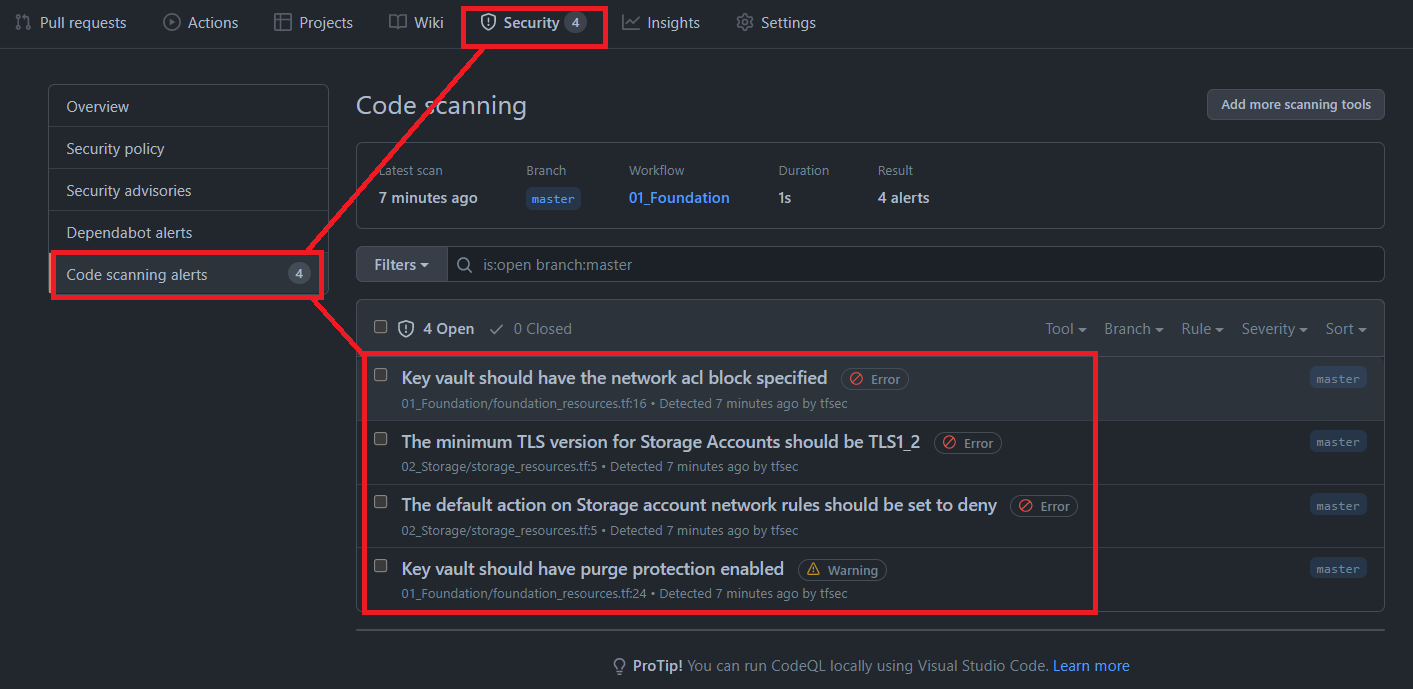Template repository - Use to deploy Azure Resources using Terraform and GitHub Reusable Workflows.
There's also a demo workflow called: Marketplace_Example.yml which shows how to use my Public Marketplace GitHub Actions instead of reusable workflows. I have put more development effort into the public actions and so they contain more features such as the ability to Deploy or Destroy Terraform plans.
You can see more detail on the public actions here:
For more in depth details on usage and examples I also have a detailed online tutorial on my blog:
See Part 1 if you want to use GitHub Reusable Workflows.
Or Part 2 if you want to use my Public Marketplace GitHub Actions instead.
This repository can be reused by anyone to:
- Learn about GitHub reusable workflows.
- Learn about GitHub Actions.
- Learn about terraform deployments in AZURE using GitHub.
- Learn about multi-stage deployments and approvals in GitHub.
- Learn how to build Terraform modules using a non-monolithic approach.
- Utilize examples shown here in your own organization to build AZURE Infrastructure at scale.
Showcasing how to use GitHub reusable workflows and GitHub environments to build enterprise scale multi environment infrastructure deployments in Azure using a non-monolithic approach, to construct and simplify complex terraform deployments into simpler manageable work streams and reduce duplicate workflow code by utilizing reusable GitHub workflows.
In this demo repository, each caller workflow is numbered and can be independently deployed e.g:
01_Foundation:
- The first
callerworkflow01_Foundationwill call and trigger a reusable workflowaz_tf_planand create a foundational terraform deploymentPLANbased on the repositorypath: ./01_Foundationcontaining the terraform ROOT module/configuration of an Azure Resource Group and key vault. The plan artifacts are validated, compressed and uploaded into the workflow artifacts, the caller workflow01_Foundationwill then call and trigger the second reusable workflowaz_tf_applythat will download and decompress thePLANartifact and trigger the deployment based on the plan. (Also demonstrated is how to use GitHub Environments to do multi staged environment based deployments with approvals - Optional).
02_Storage:
- Next the second
callerworkflow02_Storagecan be used and triggered independently to expand on the first deployment in a separate state file to deploy some additional resources, building up the resource inventory in a non-monolithic way. In the case of this demo,02_Storagewill call the same reusable workflows used in the firstcallerworkflow to create a terraform deploymentPLANbased on the repositorypath: ./02_Storagecontaining the terraform ROOT module/configuration for one General-V2 and one Data Lake V2 Storage storage account. The plan artifacts are again validated, compressed and uploaded into the workflow artifacts, the caller workflow02_Storagewill then call and trigger the second reusable workflowaz_tf_applythat will download and decompress thePLANartifact and trigger the deployment based on the new separate plan.
03_etc_etc:
- The same process can be repeated to create more terraform root modules/configurations to deploy even more resources in a non-monolithic way etc etc...
In addition IaC scanning using TFSEC has also been applied to the PLAN reusable workflow, using the input enable_TFSEC. By default this setting is set to FALSE.
NOTE: If you are using a Private repository you will need a GitHub Enterprise account to enable code scanning with TFSEC. The code scanning feature is included however on any Public repositories. If you are using a Private repository and do not have an enterprise account, leave this setting on the default: FALSE and have a look at my other blog post on IaC Scanning with TFSEC for VsCode (Extension) instead.
Each terraform configuration, when calling the PLAN reusable workflow will be scanned for any Terraform IaC vulnerabilities and misconfigurations and the results will be published on the GitHub Projects Security tab e.g:
- Dependabot is enabled to check dependencies for all
github-workflowsas well as eachTerraformmodule version. - Dependabot will open a PR on the
masterbranch with the version bump automatically. - The workflow
Marketplace_Example_Tests.ymlwill run upon a Dependabot automated PR to run aplanas a test with the new versions. - Dependabot cannot use
Actions Secrets, thus the same secrets are added to the GitHub repositorydependabot secrets. - Terraform dependencies are tested using the Marketplace_Example_Tests.yml workflow and additional permissions are added due to the following documentation:
Dependabot is able to trigger GitHub Actions workflows on its pull requests and comments; however, certain events are treated differently.
For workflows initiated by Dependabot (github.actor == "dependabot[bot]") using the pull_request, pull_request_review, pull_request_review_comment, and push events, the following restrictions apply:
GITHUB_TOKENhas read-only permissions by default.- Secrets are populated from
Dependabot secrets. GitHub Actions secrets are not available!
jobs:
# Dependabot will open a PR on terraform version changes, this 'dependabot' job is only used to test TF version changes by running a plan.
dependabot:
runs-on: ubuntu-latest
permissions:
pull-requests: write ## Additional GITHUB_TOKEN permission for the dependabot job
issues: write ## Additional GITHUB_TOKEN permission for the dependabot job
repository-projects: write ## Additional GITHUB_TOKEN permission for the dependabot job
if: ${{ github.actor == 'dependabot[bot]' }} ## Run test against the automatic dependabot PR raised
